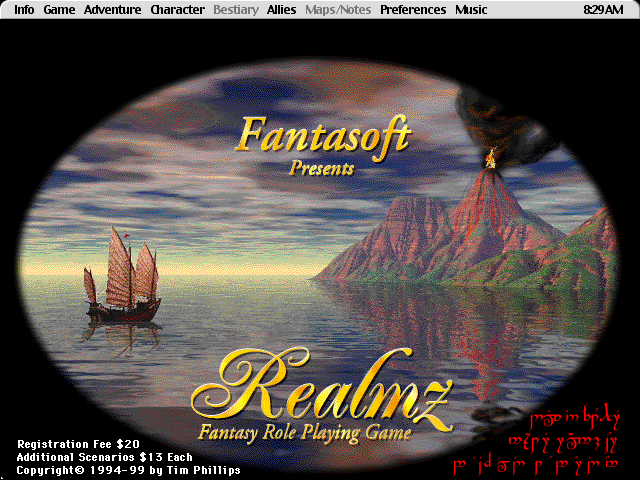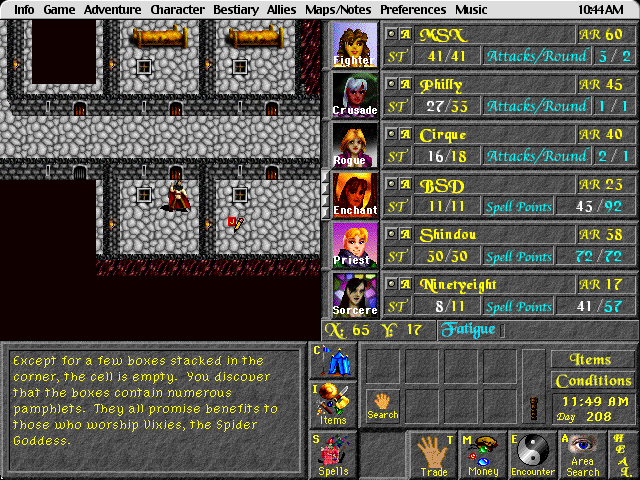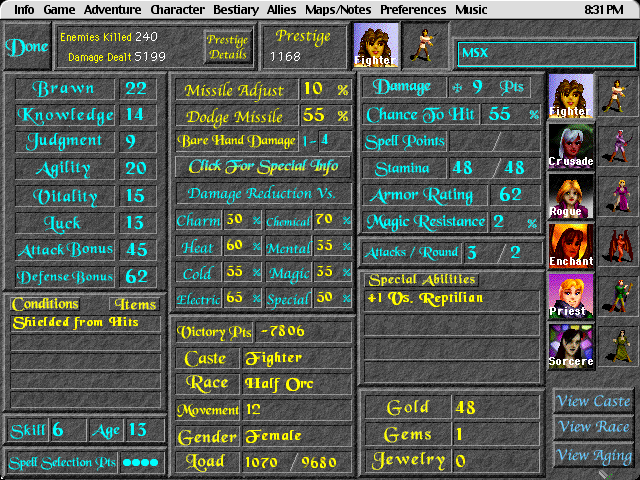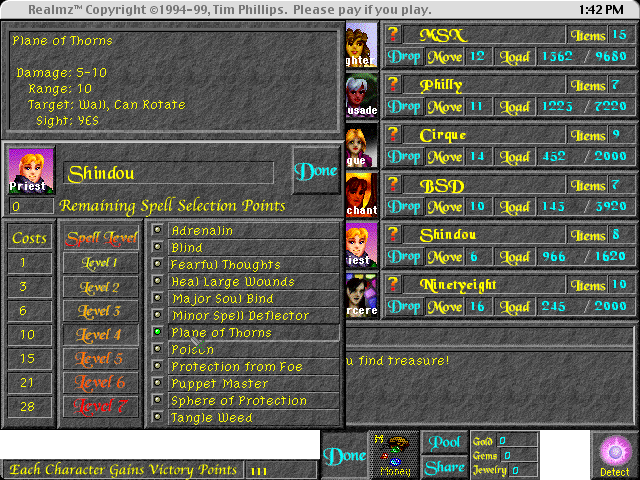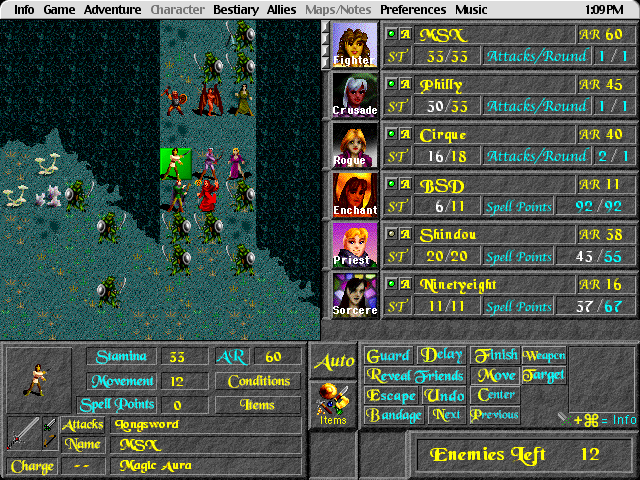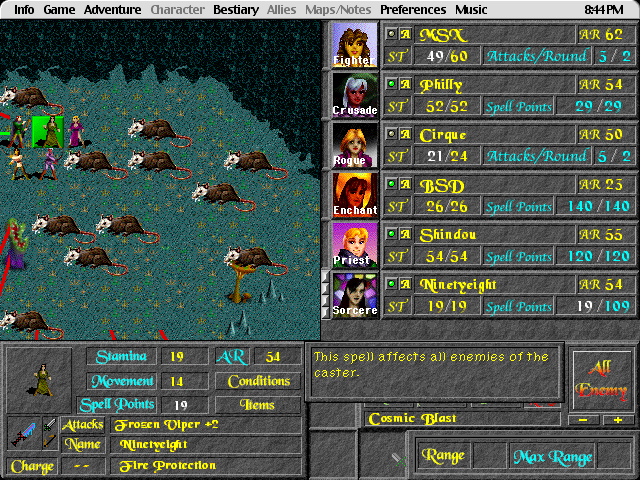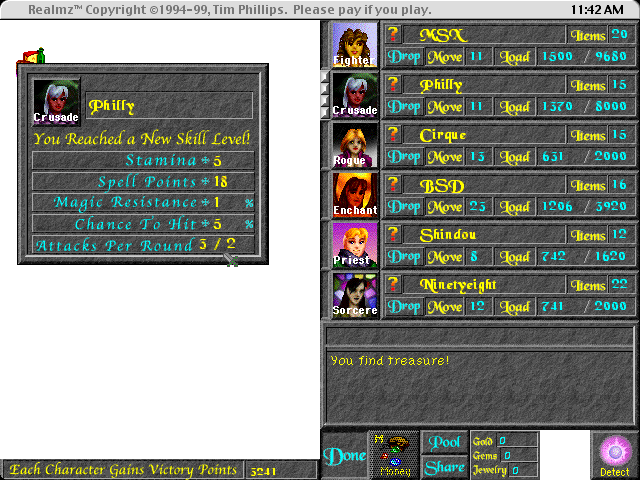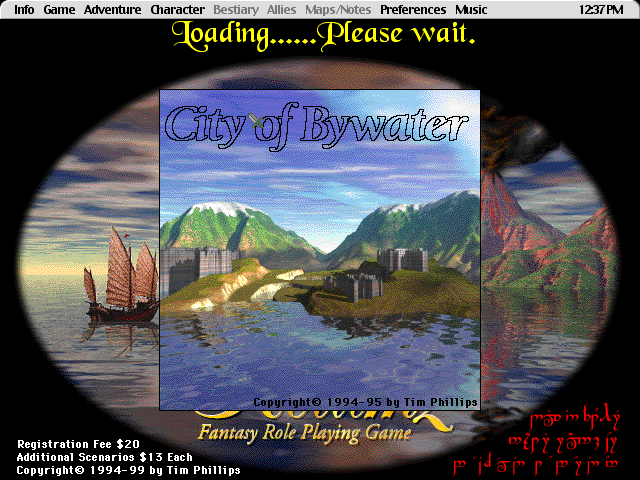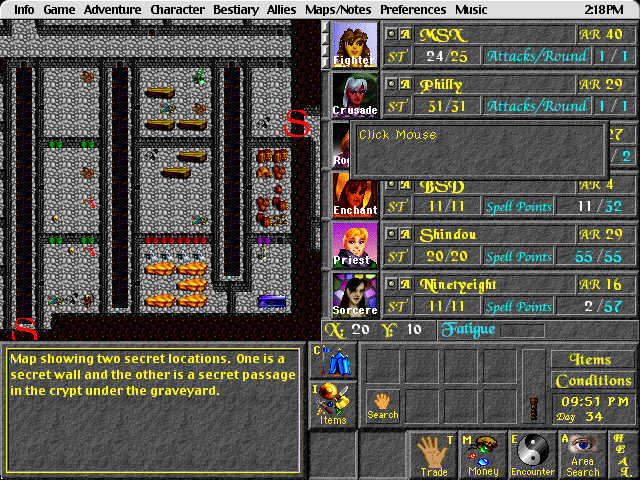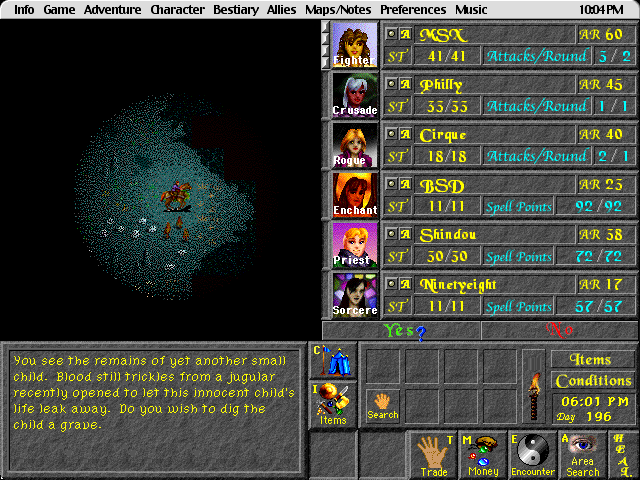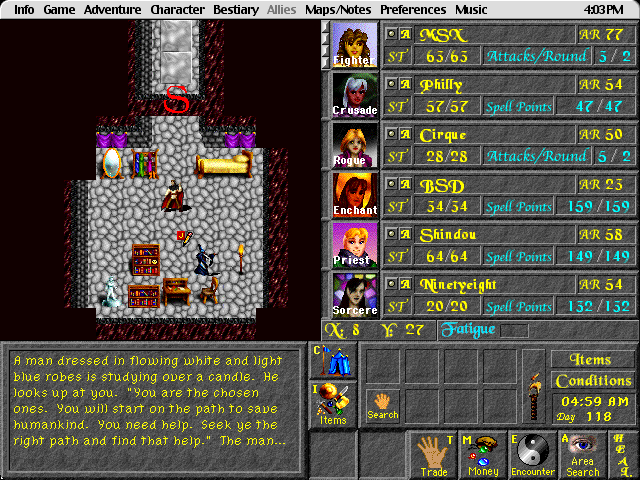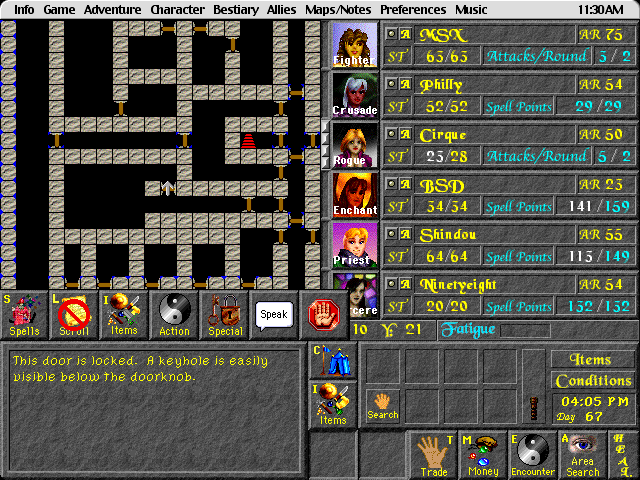Realmz – Fantasoft - 1994 - First time playing?: Yes!
 Once again we are looking at a Mac game with a reputation that precedes it. Realmz is especially beloved among the vintage Mac community. First released for Mac in 1994 by Fantasoft (the same publisher that brought us Monkey Shines), Realmz was continuously updated all the way up to 2002, building up a dedicated fandom and community as it went on. A Windows version of Realmz was released in 1999, though the Mac original continued to be the most supported and up-to-date version. As a result of this lengthy period of support from both the developers and the fandom alike, Realmz is an utterly massive game now, once which I’m aware this review will only be scratching the surface of.
Once again we are looking at a Mac game with a reputation that precedes it. Realmz is especially beloved among the vintage Mac community. First released for Mac in 1994 by Fantasoft (the same publisher that brought us Monkey Shines), Realmz was continuously updated all the way up to 2002, building up a dedicated fandom and community as it went on. A Windows version of Realmz was released in 1999, though the Mac original continued to be the most supported and up-to-date version. As a result of this lengthy period of support from both the developers and the fandom alike, Realmz is an utterly massive game now, once which I’m aware this review will only be scratching the surface of.
Realmz’s inspirations come from a multitude of different CRPGs, but if there's one that is probably at the forefront of inspirations, it's the Dungeons & Dragons Gold Box series. For those not in the know, the Gold Box games were a series of CRPGs all using the same engine and basic gameplay and structure, named after the golden packaging the games were sold in. The combat system is done in the style of a turn-based strategy game and is very similar to Realmz, though the exploration is very different in that Realmz has a lot of top down exploration, while exploration in Gold Box is almost entirely first person. Something else notable about Gold Box is that each new game in the series was something of a standalone expansion. Characters you created and leveled up and equipped can be transferred over to later games in the series via save data importing. This is by no means a concept that debuted here, as other games such as Wizardry implemented similar ideas, but this concept of making a bunch of games in a similar engine and mold that saved character data can be transferred across is more or less the kind of idea Realmz is trying to recreate, in a uniquely shareware way.
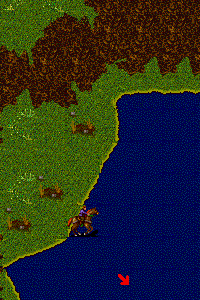 Purchasing Realmz would give you full access to two “scenarios”, those being The City of Bywater and Prelude to Pestilence. Each scenario is its own self-contained game, with different worlds, stories, quests, dungeons and so on, but all using the same gameplay mechanics and art assets. When you're done with one scenario, you can take the custom characters that you played that scenario with directly over to the next scenario. Furthermore, Fantasoft released even more scenarios for Realmz over the course of its eight-year-long lifespan that could be purchased online for $13 each. And if that is not enough Realmz for you, there's also the Divinity editor; an application for making and sharing your own Realmz scenarios. Needless to say, if you love Realmz, you'll have no shortage of scenarios to play.
Purchasing Realmz would give you full access to two “scenarios”, those being The City of Bywater and Prelude to Pestilence. Each scenario is its own self-contained game, with different worlds, stories, quests, dungeons and so on, but all using the same gameplay mechanics and art assets. When you're done with one scenario, you can take the custom characters that you played that scenario with directly over to the next scenario. Furthermore, Fantasoft released even more scenarios for Realmz over the course of its eight-year-long lifespan that could be purchased online for $13 each. And if that is not enough Realmz for you, there's also the Divinity editor; an application for making and sharing your own Realmz scenarios. Needless to say, if you love Realmz, you'll have no shortage of scenarios to play.
We will just be looking at City of Bywater and Prelude to Pestilence today. These two scenarios were later released as freeware by Fantasoft, so the registration codes to unlock them are pretty widely available online. The rest of the scenarios meanwhile were, up until recently, sold for a discounted $5 each, but have since become abandonware as Fantasoft’s site is sadly long gone.
Before we play
We of course have to make a party of custom characters to play as before we can start with the scenarios. I mentioned in my Avernum review that I often struggle with character creation in Western RPGs. When asked to completely start from scratch I often have no idea where to start, especially when it's a game I've never played before and don't know the mechanics of. I think agility affects damage dealt with bows and arrows, right? Or what if strength determines that in this game? Or is damage dealt by missile weapons just purely determined by the strength of the bow and arrow equipped? I'd check the manual while in character creation if that was possible, but Realmz runs in an exclusive full screen mode that can't be alt-tabbed out of, so the text document that serves as the manual isn't accessible while in-game. I still have fears stemming from when I couldn't get past the second enemy encounter of Baldur’s Gate as a teenager because I had no idea how to build a D&D character. I've gotten better at it since, fortunately. Dating an RPG nerd girlfriend definitely helps. But either way, my point is that Realmz is exactly the kind of game that absolutely terrifies me, because just look at how densely packed with information these character sheets are.
There’s still another three sheets of important information about the character not visible on this screen, by the way.
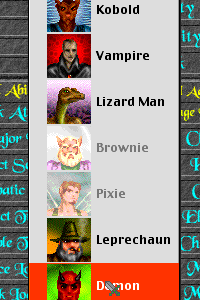 Even when referencing the manual however, a lot of what the stats do is still left vague. Judgement for instance is described by the manual as “the measure of how well a character can apply past experiences to the current situation”... Whatever that means. What it's trying to convey is that the judgement stat increases your chance of success in certain dialogue trees and special events that require a judgement stat skill check. What the manual doesn't mention at all, even in a roundabout way, is that judgement also affects spell point gains on level ups for priests, which is really important information. Then again, I showed this to my girlfriend and she was completely unfazed by the crypticness of this description, so maybe CRPG fans are just more powerful than me.
Even when referencing the manual however, a lot of what the stats do is still left vague. Judgement for instance is described by the manual as “the measure of how well a character can apply past experiences to the current situation”... Whatever that means. What it's trying to convey is that the judgement stat increases your chance of success in certain dialogue trees and special events that require a judgement stat skill check. What the manual doesn't mention at all, even in a roundabout way, is that judgement also affects spell point gains on level ups for priests, which is really important information. Then again, I showed this to my girlfriend and she was completely unfazed by the crypticness of this description, so maybe CRPG fans are just more powerful than me.
At the same time though, it's also pretty exciting. Make no mistake, I'm absolutely all for complex and in-depth mechanics, even if the learning curve is steep. This isn't a game with just the bare minimum standard fantasy race lineup of humans, elves and three varieties of short people that you see so commonly in CRPGs like early Wizardry and Ultima. No, here you have five varieties of short people, but also vampires, demons, pixies, furries and scalies. This is a game where you can play as a bloody leprechaun if you want to. There's 19 playable races in all, alongside 19 classes as well. Intimidating it may be, especially with the lack of in-game documentation or tutorials, but it also gives you a ton of freedom to make all kinds of varied characters. You can even change the names of the playable races if you want to, in order to essentially add in any species that you want. The wide range of portraits and character sprites to choose from are also fantastic. I absolutely love the Half Orc portrait I used for MSX, she’s absolutely adorable.
In the end, I went with a fighter, a crusader, a rogue, an enchanter, a priest and a sorcerer. Fighter is the basic hard hitting class. Enchanters, priests and sorcerers are the primary spell casters which each have their own spell lists. Priests and sorcerers are essentially light magic and dark magic respectively, while enchanters have a focus on creature summoning. Crusaders are melee fighters who can eventually learn priest spells, while rogues are great lockpickers and lightning fast glass cannons, hitting hard and attacking multiple times in a single turn, but not having the greatest defences. Due to the heavy magic focus, my team struggled a bit early on, when I had very few spell points to work with and all, but after a few level ups increased my SP cap, I didn’t regret my choice at all. Magic is very powerful in Realmz.
The gameplay
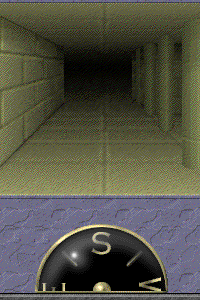 Although City of Bywater and Prelude to Pestilence are essentially treated as individual games just using the same engine, the general mechanics between them are more or less the same, so let’s give an overview on what Realmz is like to play. Exploration is done from a top-down view across a tile-based map, with you moving your character across the map with either the mouse or keyboard. The controls are surprisingly simple by the genre’s standards, not even having a use/interact key. You'll instead automatically get a dialog box asking you if you want to interact with something when you stand on the same tile as it. This allows you to enter buildings, talk to NPCs, accept quests, find treasure and so on. The game also has secrets; hidden passageways and items that have a chance to be revealed when you walk on a tile adjacent to them, with that chance increasing in likelihood via using magic to detect secrets, or entering search mode by clicking the search icon on the UI, which in addition to increasing your chance of finding secrets, also increases your chance of finding random encounters as a result of your characters spending more in-game time investigating every tile they walk across. Most dungeons are explored from the same kind of top-down view as the overworld, although dark caves may require you to light a torch to get a better view of your surroundings. Furthermore, there’s also what the game calls 3D dungeons, where the view shifts to first-person dungeon crawling akin to Wizardry.
Although City of Bywater and Prelude to Pestilence are essentially treated as individual games just using the same engine, the general mechanics between them are more or less the same, so let’s give an overview on what Realmz is like to play. Exploration is done from a top-down view across a tile-based map, with you moving your character across the map with either the mouse or keyboard. The controls are surprisingly simple by the genre’s standards, not even having a use/interact key. You'll instead automatically get a dialog box asking you if you want to interact with something when you stand on the same tile as it. This allows you to enter buildings, talk to NPCs, accept quests, find treasure and so on. The game also has secrets; hidden passageways and items that have a chance to be revealed when you walk on a tile adjacent to them, with that chance increasing in likelihood via using magic to detect secrets, or entering search mode by clicking the search icon on the UI, which in addition to increasing your chance of finding secrets, also increases your chance of finding random encounters as a result of your characters spending more in-game time investigating every tile they walk across. Most dungeons are explored from the same kind of top-down view as the overworld, although dark caves may require you to light a torch to get a better view of your surroundings. Furthermore, there’s also what the game calls 3D dungeons, where the view shifts to first-person dungeon crawling akin to Wizardry.
Combat encounters can either happen due to scripted events or as purely random encounters. The battle system is essentially a turn-based strategy game. You'll individually command your units one by one, moving them across the battlefield as far as their movement points will allow, and then they can either attack an enemy unit directly, cast magic, guard, use an item or bandage a wounded party member. The UI and controls take some getting used to, as the HUD is quite cramped and tightly packed with tons of buttons on screen, but ultimately once you understand what you're doing you'll quickly discover it's much more simple than it looks.
That's not to say the gameplay itself is simple however, as the sheer variety of spells available results in a staggering amount of different possible play styles and strategies. As you frequently fight massive hordes of enemies, crowd control is important to stop your units from getting swarmed, and that's where magic comes in. Why not even the odds by having your enchanter summon hordes of their own monsters? Or you could have your priest trap the surrounding tiles with thorns that deal damage to enemies that cross over them. Buffs and debuffs and status effects are aplenty, such as increased accuracy, evasion, charm, poison and so on, in order to aid your physical attackers.
 There's a couple of neat things of note about magic in Realmz. First off is the power system. Every spell in the game has a trait that can be multiplied in strength by casting it at a higher power, indicated by the x1-x7 buttons present on the UI when casting spells. Increasing the power level of a spell you're casting increases its spell point cost, in addition to either increasing range, damage, area of effect, duration or max amount of targets, depending on the spell in question. For a contemporary example of a game that does something similar, it's somewhat akin to how magic is handled in Disgaea, as in that game you can also improve the area of effect of your spells by spending more MP on them, though Wizardry VI: Bane of the Cosmic Forge is almost certainly where Realmz drew the inspiration from as magic is implemented near identically in that game. The concept isn't new, needless to say, but it's still implemented well. The damage dealt by your magic isn't increased by leveling up, but the amount of spell points you have available to cast from are increased, thus allowing you to gradually cast more and more powerful versions of your basic spells as your SP cap goes higher.
There's a couple of neat things of note about magic in Realmz. First off is the power system. Every spell in the game has a trait that can be multiplied in strength by casting it at a higher power, indicated by the x1-x7 buttons present on the UI when casting spells. Increasing the power level of a spell you're casting increases its spell point cost, in addition to either increasing range, damage, area of effect, duration or max amount of targets, depending on the spell in question. For a contemporary example of a game that does something similar, it's somewhat akin to how magic is handled in Disgaea, as in that game you can also improve the area of effect of your spells by spending more MP on them, though Wizardry VI: Bane of the Cosmic Forge is almost certainly where Realmz drew the inspiration from as magic is implemented near identically in that game. The concept isn't new, needless to say, but it's still implemented well. The damage dealt by your magic isn't increased by leveling up, but the amount of spell points you have available to cast from are increased, thus allowing you to gradually cast more and more powerful versions of your basic spells as your SP cap goes higher.
I also found the ray-type magic quite interesting. If a spell is described as ray magic, that means that a straight line will be traced from the caster to the caster’s target, and anything caught in that line of fire will also take damage, including allies. As a result, positioning is even more important, not just for the caster, but all of your other units as well, which makes it extremely satisfying when you line yourself up perfectly to avoid all your party members and pierce through a ton of enemies at once.
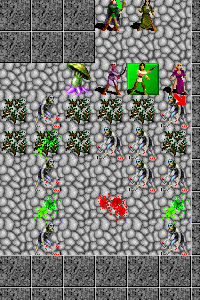 Now while I do enjoy the battle system, it does feel a bit overly luck-based and unbalanced to me at times. In particular, there's a status effect that enemies can inflict on you called ‘helpless’, and it really lives up to the name. When a character is helpless they are incapable of acting for several turns and also have their defence stat severely cut down to the extent that being hit by basically any attack at all is likely going to be a one-hit KO. Certain enemies are capable of inflicting helplessness on multiple targets at once, so it's entirely possible for you to get completely decimated on the first turn if your opponents immediately make you helpless and one-shot you before you even have a chance to act at all. Charm is similarly busted, with enemies often opening battles by casting it on your entire party immediately, and if a character is charmed, they stay charmed for the rest of the battle, and furthermore are loyal enough to their charmers that they’ll keep fighting against you even after you’ve killed every other enemy. I think the only way to get them back on your side without knocking them out yourself is to charm them back with your own charm spells. With that said though, as long as you have a chance to cast some spells, you can very quickly turn the tables due to the intense power of magic in Realmz. You may be fighting dozens of enemies at once, but as you've got spells that are not only powerful damage dealers, but also hit every single enemy at once with a single cast, you'll be able to manage. And hey, if that’s still not enough, then summoning some monsters or charming some enemies yourself can help you out.
Now while I do enjoy the battle system, it does feel a bit overly luck-based and unbalanced to me at times. In particular, there's a status effect that enemies can inflict on you called ‘helpless’, and it really lives up to the name. When a character is helpless they are incapable of acting for several turns and also have their defence stat severely cut down to the extent that being hit by basically any attack at all is likely going to be a one-hit KO. Certain enemies are capable of inflicting helplessness on multiple targets at once, so it's entirely possible for you to get completely decimated on the first turn if your opponents immediately make you helpless and one-shot you before you even have a chance to act at all. Charm is similarly busted, with enemies often opening battles by casting it on your entire party immediately, and if a character is charmed, they stay charmed for the rest of the battle, and furthermore are loyal enough to their charmers that they’ll keep fighting against you even after you’ve killed every other enemy. I think the only way to get them back on your side without knocking them out yourself is to charm them back with your own charm spells. With that said though, as long as you have a chance to cast some spells, you can very quickly turn the tables due to the intense power of magic in Realmz. You may be fighting dozens of enemies at once, but as you've got spells that are not only powerful damage dealers, but also hit every single enemy at once with a single cast, you'll be able to manage. And hey, if that’s still not enough, then summoning some monsters or charming some enemies yourself can help you out.
Wonky as the balancing may be, leveling up is still very satisfying. The EXP requirements to level up are steep and often result in hours of gameplay before you get a single level, but that makes the surprisingly significant power increase that a single level brings all the more rewarding. Simply having your HP, SP and hit rate go up is rewarding enough, but then you're also given the opportunity to choose what spells your magic casters will learn as well, giving you a brand new tool at your disposal for combat and support alike. Sometimes a single level is all it takes to have a boss you're stuck on changing from unwinnable to manageable. Even better, at certain level milestones your characters also get the ability to attack more times in a single turn, helping even further.
The music also kind of slaps. It uses synthy MOD music that sounds right out of an Amiga game’s OST, a few tracks here and there reminding me of- wait a second. I have heard some of this before! The temple theme in Realmz is straight up the exact same MOD music used for the title screen in Pinball Dreams! Well, okay, the soundtrack may be entirely plagiarised, but they chose some good sources to steal from at least. I adore Pinball Dreams and its soundtrack, so good taste there. But um, please don't steal music if you didn’t get permission, Fantasoft. I didn't recognize any of the other music tracks, but I have been informed that the battle theme is a MOD rendition of Electricity by Orchestral Manoeuvres in the Dark. If anyone knows about the sources of other tracks in the game, I'd be interested to hear.
City of Bywater
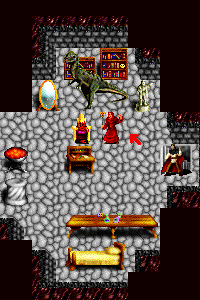 As stated by the game itself, City of Bywater doesn't really have a story or an objective, as much as it's just an open map with a few quests to find and clear as you get a feel for the controls, interface and mechanics of Realmz, as well as giving you an avenue to level up your characters in before you take on Prelude to Pestilence, which expects your party members to be at level 5 on average.
As stated by the game itself, City of Bywater doesn't really have a story or an objective, as much as it's just an open map with a few quests to find and clear as you get a feel for the controls, interface and mechanics of Realmz, as well as giving you an avenue to level up your characters in before you take on Prelude to Pestilence, which expects your party members to be at level 5 on average.
City of Bywater centers around a city that to be honest isn't even that particularly close to water. That singular city is the only settlement in this scenario, but that's not to say that the scenario is particularly small. Caves, crypts, cellars, ruins and dungeons to explore are plentiful, both sprawled across the overworld as well as laying hidden under the city itself, accessible through the basements of bars and town halls. It's a little aimless as a result of the lack of story, with the only justification being that your party is “seeking adventure”, but by talking to NPCs you'll discover some quest lines to give you some direction. Frequently, these quests also result in you obtaining maps, which in addition to being helpful for getting your bearings, also shows you locations of secrets and treasures.
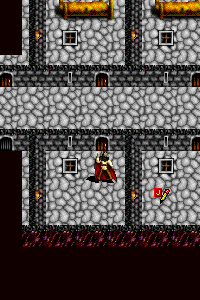 Progression is somewhat akin to Escape Velocity, another game that doesn't really ever “end” as much as you just run out of quests eventually. Like that game also, the progression in City of Bywater is quite non linear as you're given free reign to explore and find things at your own pace. The closest to a final boss I found is the spider worshiping cult right outside Bywater, but if you’re playing with a party of brand new freshly made characters, you're going to stand no chance against the cult’s forces until you get some weapons, items, levels and spells to hold your own. So, finding more quests and dungeons at a lower level until you're ready to take on the spider hordes is essential.
Progression is somewhat akin to Escape Velocity, another game that doesn't really ever “end” as much as you just run out of quests eventually. Like that game also, the progression in City of Bywater is quite non linear as you're given free reign to explore and find things at your own pace. The closest to a final boss I found is the spider worshiping cult right outside Bywater, but if you’re playing with a party of brand new freshly made characters, you're going to stand no chance against the cult’s forces until you get some weapons, items, levels and spells to hold your own. So, finding more quests and dungeons at a lower level until you're ready to take on the spider hordes is essential.
The manual to Realmz claims that the people of Bywater are honest folk, and I am realising now that the manual lied about that on purpose to run with the joke of damn near every NPC in the game trying to con you. Choose the wrong option in any dialogue tree, especially after finishing a quest, and you'll get cheated out of your reward at best or attacked at worst. But hey, at least some of them give helpful advice, like this guy letting me know that it's safe to set up camp here and no ogres will attack me if I rest.
Okay, never mind, everyone in Bywater can get bent, actually.
I will say, the writing here doesn't do much for me. There's not really any substance, interesting world building, memorable characters or anything here, mostly being a case of MMO style quests in that “this monster’s continued existence offends me personally, go massacre them for me” mold. Something else I noticed is how oddly gruesome the writing in City of Bywater is. It delights in describing the mutilated corpses of children and other such pleasant imagery throughout, and it feels weirdly off to me as a result. The tone is pretty light and carefree with the exception of how visceral the flavour text is.
Nonetheless, it’s a good introduction to Realmz. Lots to see and do, lots to uncover under the surface, lots of battles, some of which are surprisingly challenging, it’s fun throughout. Sure could have done without that first-person dungeon that had you do a teleporter maze without a minimap or even a working compass, but even that was small enough to not really have a huge chance to grate.
Prelude to Pestilence
The second scenario retains the fairly open ended structure of Bywater, but with a much more clear objective. The town of Mountain View is being threatened by the army of a powerful sorcerer by the name of Griloch, and you must find and recruit a band of legendary heroes to aid you in taking them out. It’s… also not much of a story to be honest, but it’s a fine simple enough setup. There’s also far less of that boring “kill all the monsters because they’re smelly” kind of questing than there was in Bywater, for what that’s worth. Personally though, I can't get too excited about fantasy writing as mundane and by the numbers as the screenshot below.
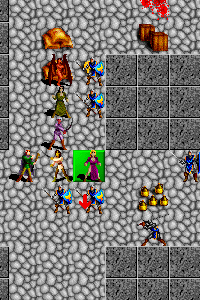 Honestly, I was expecting Prelude to Pestilence to be a bit bigger, but it’s tiny compared to City of Bywater. The dungeons are few and far between, and with a singular exception, all rather small and linear without much to explore. Somewhat scummily also, although there’s a massive chunk of the overworld that isn’t accessible until you register the game (which of course wasn’t free back then), by the time you actually register and access that section of the map you quickly discover that it’s mostly an empty field with only two points of interest; a farmhouse with one of the heroes you need to recruit and nothing else, and a cave that leads to a small room with another one of the heroes, a lost little girl and a book being guarded by some spiders. 90% of the scenario is playable without even buying the full version, so all you really get out of registering is access to a few important characters that you need to talk to in order to access the final boss.
Honestly, I was expecting Prelude to Pestilence to be a bit bigger, but it’s tiny compared to City of Bywater. The dungeons are few and far between, and with a singular exception, all rather small and linear without much to explore. Somewhat scummily also, although there’s a massive chunk of the overworld that isn’t accessible until you register the game (which of course wasn’t free back then), by the time you actually register and access that section of the map you quickly discover that it’s mostly an empty field with only two points of interest; a farmhouse with one of the heroes you need to recruit and nothing else, and a cave that leads to a small room with another one of the heroes, a lost little girl and a book being guarded by some spiders. 90% of the scenario is playable without even buying the full version, so all you really get out of registering is access to a few important characters that you need to talk to in order to access the final boss.
The highlight here is the Griloch hideout, a first-person dungeon you get access to early on that is far more sprawling and expansive than any other cave or dungeon in the game. All of the first-person dungeons in City of Bywater were extremely short, so having such a massive one to explore here with hidden stockpiles and shops and encounters and so on really gives the first-person mode a better chance to shine. I was definitely hoping for more content like this in Prelude to Pestilence overall.
The other issue with Prelude to Pestilence is just how little enemy variety there is. You’re almost exclusively fighting the same Griloch soldiers and wizards with very little variation, not just in individual enemies, but also in enemy formations. There’s some rats, spiders, snakes and green dragons if you know where to look for them, but nine times out of ten it’s all Griloch all the time. At least they give good experience, but it still gets old fast.
I didn’t have a miserable time with Prelude to Pestilence or anything, but as a scenario it’s pretty weak. Honestly, having a story is kind of the only thing I feel it has over Bywater, but that story is so threadbare that it doesn’t matter much. It’s more Realmz, and Realmz is fun, so you can still get enjoyment out of it, but I definitely hope the later scenarios are a bit more fleshed out than this.
Conclusion
I really enjoyed my time with Realmz. I can definitely see why there's such a dedicated fandom for this game and why it's so beloved by the Mac gaming community. With that said however, there was a nagging voice in the back of my head the whole time asking me the question of “but does it live up to Avernum?” Reminder that Avernum was a remake of an earlier game by the name of Exile, which is notable because not only does Exile look and play fairly similar to Realmz and both came out in the mid 90s, but also they shared a publisher, as Fantasoft published Exile before Spiderweb Software went independent.
Personally, I think I prefer Exile/Avernum, but the more I thought about it I realised it's a bit of an apples and oranges comparison. Yes, both games have you create a party of adventurers with which you explore an overworld littered with caves, dungeons, quests and more. Yes, both games have a similar turn based strategy battle system. The differences are much more in priority and structure. Realmz is more of an open ended sandbox than Avernum. Both games are non-linear, but Avernum has a stronger narrative structure, and with that more structured game design comes a more controlled difficulty curve and gradual introduction of new game mechanics. Realmz meanwhile may be the less balanced game, but makes up for that by instead focusing on a greater level of freedom for the player to build their party however they like, balance be damned. Choose what order you learn spells in, choose what level your freshly created characters start at, choose from a much wider selection of races and classes, rename whatever you want, choose whether or not you start the next scenario with a party of the recommended level or with your main adventuring team that ended up hideously overpowered over the course of the last couple of scenarios, it's all up to you to control how you please.
Ultimately, I can see myself happily revisiting both Avernum and Realmz. Both are fun, both fill different niches and both are loaded with a staggering amount of content and replay value. Eventually, the answer to that earlier question of “does it live up to Avernum” was a resounding “why not both?”
I’m by no means done with Realmz on this site either. I do fully intend to check out the other scenarios down the line as well, and will share my thoughts on them once I do. Additionally, if I got any information wrong in this review, please contact me and let me know!
- Page written by MSX_POCKY, 11th November 2025
